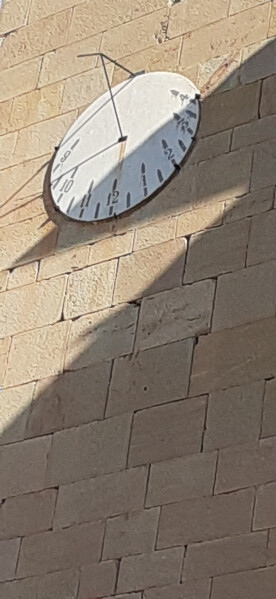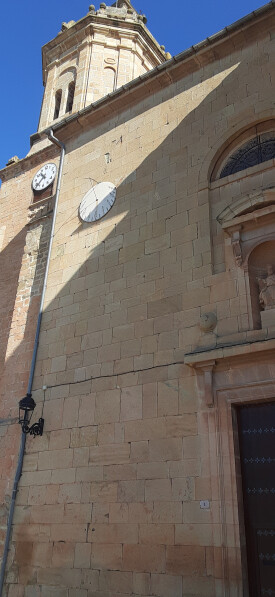Camino 3: Lost
On a single day, in two successive villages only a few kilometers apart, I was approached by elderly gentlemen concerned that I was lost. “Camino,” they said, with many other words I could not catch, “alli”—over there (they would point). In the first case I was deliberately off trail, wanting to see the local church. One imagines pilgrims centuries ago orienting their walks from church tower to church tower. This tower was remarkable, up close, for its sundial, which was just about exactly one hour off. When they made sundials they did not have daylight saving time.
But in the next village I was lost, although I did not know it. After seeking out its local church (both, by the way, were locked), I started going the wrong way, and who knows where I would be now if that man had not been kind to speak to me.
Endless are the helpful encounters of people helping pilgrims.
The night before I left Najara in the Rioja region it had rained heavily. The walk began in coolness on rocky trails, but soon we were in red mud that stuck to our footwear like wet concrete. I was focused on placing each step in the least bad spot, on the edge of the road or on the higher bits. My head was bent down; my attention was entirely on the mud, when I looked up for a moment and saw that mine were the only footprints on the road. I had missed a turn, or maybe taken one I should not have taken—I did not know where I was or how far back I needed to go.
But the mud! I did not want to go back. Ahead, maybe half a mile (I do not estimate in kilometers), there was a highway. I kept going. Once there, I sat down and starting looking at Google maps. The Camino did not seem to be on my map at all. I knew what the next town was, and I was just figuring out how to walk there on the side of the highway, when a farmer, driving his tractor, stopped. “Camino?” he asked. “Si,” I said. Then followed a lot of Spanish words very quickly. But his gestures were clear. I needed to go down this highway, up over the hill, then down, and “alli” was the Camino.
And it was so. Ten, fifteen minutes later I saw a sort of dotted line of pilgrims. Never did distant pack-carrying human beings look so good.
Grace is amazing. I was lost and then I was found, thanks to grace mediated from a host of the agents of God, people like thee and me.



